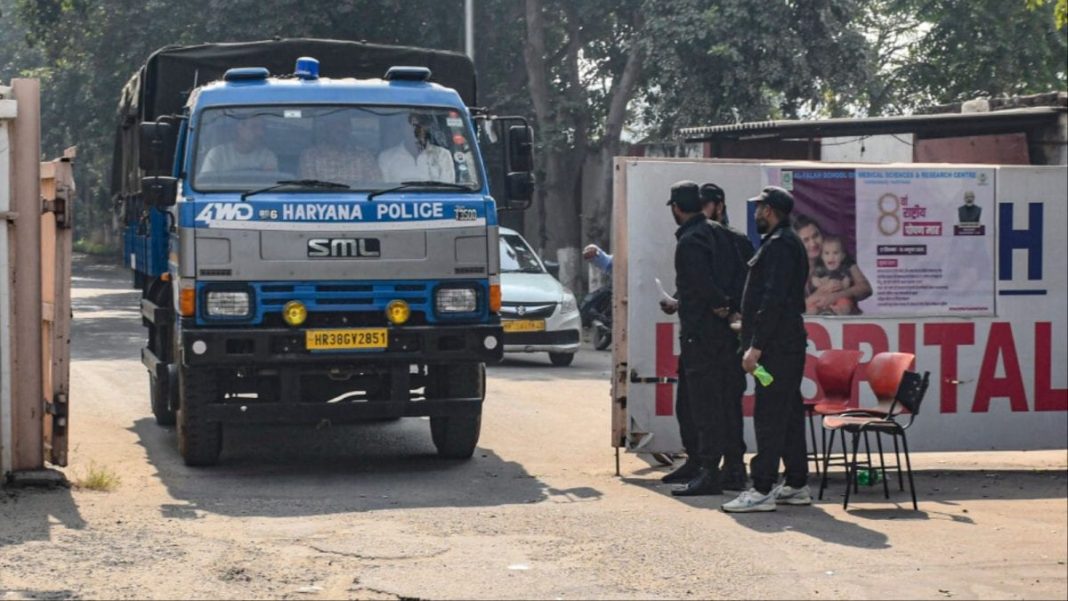The digital footprint of Al Falah University, a prominent educational institution based in Faridabad, Haryana, has abruptly vanished, coinciding with an intensified investigation by the Enforcement Directorate (ED). The university now stands at the epicentre of a serious probe involving allegations of terror funding, extensive money laundering, and the propagation of false claims regarding its affiliations and recognitions. This unfolding situation has not only cast a dark shadow over the institution’s future but also sent ripples of concern through India’s higher education sector.
The Allegations Unfold: ED’s Scrutiny
The Enforcement Directorate’s investigation into Al Falah University stems from what are reported to be multiple financial irregularities and suspicious transactions. Primarily, the university is under the scanner for alleged involvement in money laundering activities, with funds suspected of being routed to proscribed or suspicious entities, directly raising alarms about potential terror financing links. Sources familiar with the investigation indicate that the ED is scrutinising the university’s financial records, fee structures, donor lists, and expenditure patterns for any anomalies that might point towards illegal fund flows.
A significant aspect of the ED’s probe also concerns the university’s alleged practice of making false claims about its regulatory recognitions. Reports suggest that Al Falah University might have misrepresented its affiliations with apex regulatory bodies like the University Grants Commission (UGC), All India Council for Technical Education (AICTE), and the Association of Indian Universities (AIU). Such misrepresentations can have severe consequences for students, impacting the validity of their degrees and their future career prospects. The PMLA (Prevention of Money Laundering Act) has been invoked, underscoring the gravity with which the ED views the financial crimes suspected to be at play.
University’s Online Presence Vanishes Amidst Probe
In a dramatic development that underscores the severity of the ongoing investigation, the official website of Al Falah University has been taken down. Attempts to access www.alfalahuniversity.edu.in now result in an error or a blank page, effectively erasing the institution’s primary public interface. This digital disappearance has sparked widespread concern among current students, faculty members, and prospective applicants, leaving them in a state of limbo regarding academic schedules, examinations, and future admissions.
The removal of the website is particularly noteworthy given the allegations of “false claims.” Previously, university websites serve as crucial platforms for showcasing accreditations, affiliations, and program details. The sudden void raises questions about what information might have been present that could now be deemed problematic by the investigating agencies. Without an official online presence, communicating with the university administration or seeking clarification on the ongoing crisis has become exceedingly difficult for all stakeholders.
“The allegations against Al Falah University highlight a grave concern where financial irregularities intersect with national security. The ED’s rigorous probe is crucial not only to unearth the truth but also to send a clear message that such exploitation of educational institutions will not be tolerated,” stated a senior financial intelligence analyst, speaking on condition of anonymity due to the sensitive nature of the ongoing investigation. This statement underscores the profound implications of the case, extending beyond mere financial misconduct to potential threats to national security.
Broader Implications and Regulatory Oversight
The case of Al Falah University serves as a stark reminder of the vulnerabilities within the higher education ecosystem and the critical need for robust regulatory oversight. When institutions of learning are accused of such grave offences, it erodes public trust not just in the specific university but potentially in the broader education sector. Students who have invested their time, money, and aspirations are often the biggest sufferers, facing uncertainty about the legitimacy of their qualifications and the future of their academic pursuits.
The involvement of the ED, an agency typically focused on serious economic offences, highlights the increasing intersection of financial crime with other societal threats. This investigation is expected to be comprehensive, potentially leading to further arrests, asset attachments, and a detailed understanding of how such alleged networks operate. It also brings into focus the roles of various regulatory bodies in India – the UGC, AICTE, and AIU – to ensure that educational institutions adhere to statutory norms and maintain transparency in their operations and claims. This incident might prompt a closer look at the due diligence processes for granting university status and affiliations, especially to private institutions.
As the ED continues its meticulous probe, the future of Al Falah University hangs in the balance. The allegations of terror funding and false claims are extremely serious, demanding a thorough and impartial investigation. The outcome will undoubtedly have significant ramifications, not only for the individuals and entities involved but also for policy-making related to financial oversight and regulatory enforcement within India’s vast and complex education landscape, ensuring that educational pursuits remain free from such nefarious activities.




